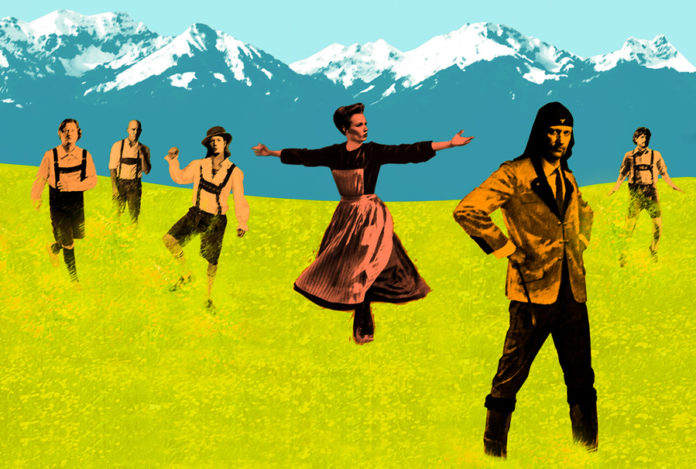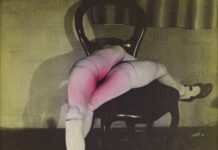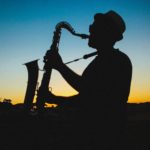
20.09. – 14.10.2018; Graz.
Volksfronten in motion. steirischer herbst detects the little “fascisms of everyday life”.
steirischer herbst’s new programme director Ekaterina Degot is in a frontline position: “Volksfronten“ is the motto of this year’s festival. Ekaterina Degot also breaks with some of the festival’s routines. She has designed the festival’s main programme as a sort of parcours through the city, which she sees as a single expanded exhibition that can be experienced in several different places in the city at the same time.
With her programme she wants to detect the little “fascisms of everyday life”, as she calls them, which can be seen more and more often nowadays: “In my opinion fascism starts out really small. With small steps toward nationalism. For me patriotism is already suspicious. I think that all things connected to this exclusive love for your own country may lead to these small first steps on the way to fascism”, says Ekaterina Degot. “It’s about isolationism. It’s about processes whose end we know from historic events. It’s about the national mobilisation of a few – primarily – positive things. Fascism doesn’t start when someone says: Let’s get rid of the Jews, the Slavs or the like. It starts with the demand for more land, more work, the demand for a “better understanding“ of history. It starts with seemingly positive things. I think it’s important to keep this perspective in mind.”
The plural use of “Volksfronten” (Popular fronts) in the festival’s title is programmatic for Ekaterina Degot: “There is no single front“, she says. “We can see that clearly if we look at things from a retrospective point of view. For instance, at first glance there might appear to be a front of progressive people. Most of them are left-wing, but they range from more radical leftists to more liberal ones, who campaign against fascism. And in some instances – in France for example – they won. Nowadays we can see different positions and opinions within the base of left-wing supporters. And one can feel that there is no joint front. The front is fragmented. We have to take on different positions when it comes to answering different questions. We can observe, for instance, left-wing ideologists speaking out against migrants on the one hand, and – at the same time – right wing exponents demanding more rights for a better social welfare state or more social equality on the other hand. Nowadays political positions are much more mixed and fragmented than before. This is way I have chosen the plural: “Volksfronten”. Today there are many fronts and each of us has to find his or her own position among them.”
However, Ekaterina Degot doesn’t want people to see her programme as a “place of alternative politics”: “We always stay on the artistic level. Our artists often work with fictional settings. This is only an interpretation or an alternative vision of the future, the reality or the past. The festival is not primarily about stirring people into action. Of course there are some artists that work with these mechanisms. But that is not our general function. We want to encourage people to reflect more, to think more. Especially through artistic works and visions.”
The main programme of this year’s steirischer herbst festival blurs the borders between genres even more than that of the past years. However, Ekaterina Degot doesn’t see any problems of getting the point across: “I think that it’s actually much easier to convey a programme that transcends genres. It’s actually all about stories. It’s about different stories that artists tell. About different places. Different moments in history. The medium in which they see their story is irrelevant,
even for me.”
What is important for Ekaterina Degot is that art roots itself exactly in the here and now: “Graz and the whole region of Styria are fascinating places for me, because it’s actually a country at the frontier. It’s always interesting to see what that really means. One can see that the mingling of so many different historical contexts is fascinating. Producing contemporary art, which could establish a dialogue with such a context is a major challenge. For me it’s important to remember that a festival doesn’t take place in the middle of nowhere, but at a specific location and a specific moment in time. It is my hope that we will manage to produce art that evolves out of these interconnected meanings and contexts.”
steirischer herbst ’18
20.09. – 14.10.2018
Eröffnung
20.09.2018
Bread & Puppet Theater
Performance und Umzug
17.00 Uhr, Treffpunkt Europaplatz
Roman Osminkin
Performance und Intervention
19.30 Uhr, Schlossbergplatz
Laibach
Musikperformance
21.00 Uhr, Kasematten, Schlossberg
Volksfronten all over Graz
Einige Stationen:
21.09. – 14.10.2018
Milica Tomić
Forum Stadtpark
Henrike Naumann
Haus der Architektur,
Ines Doujak
Kulturzentrum bei den Minoriten
Funda Gül Özcan
Ehemalige Ankara Türkü Bar, Griesgasse
herbstbar
Postgarage Café
Dreihackengasse 42
www.postgarage.at
Recherchezentrum
Archivmaterial des steirischen herbst
Palais Attems, Sackstraße 1
Büro der Offenen Fragen
Alles über das Programm 2018 anhand von 100 offenen Fragen, über zeitgenössische Kunst und Politik, Literatur und Geschichte sprechen und mit Ausstellungsparcours
Volksgartenstraße 4–6
Musikprotokoll
Zeitgenössische und experimentelle Musik
04.10. – 07.10.
Various Locations
www.musikprotokoll.orf.at











